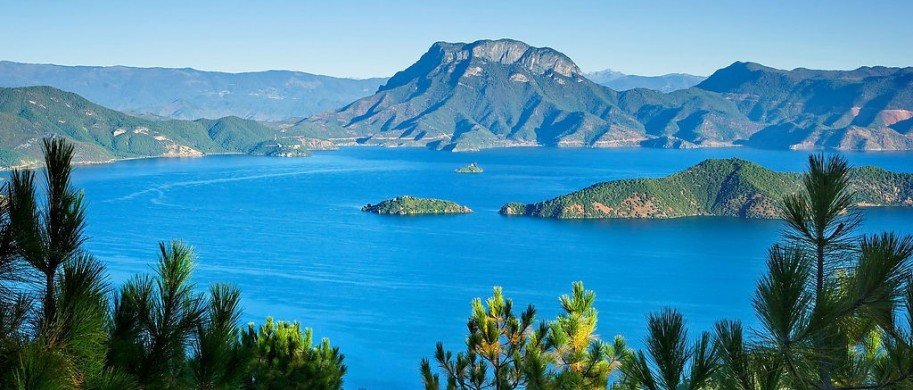
Lugu Lake is located in the North West Yunnan plateau in the centre of Ningliang Yi Autonomous County. The middle of the lake forms the border between the Ninglang County of Yunnan Province and the Yanqing County of Sichuan Province. The formation of the lake is thought to have occurred in a geological fault belonging to the geological age of the Late Cenozoic. It is an alpine lake at an elevation of 2685 metres and is the highest lake in the Yunnan Province. The lake is surrounded by mountains and has five islands, four peninsulas, fourteen bays and seventeen beaches.
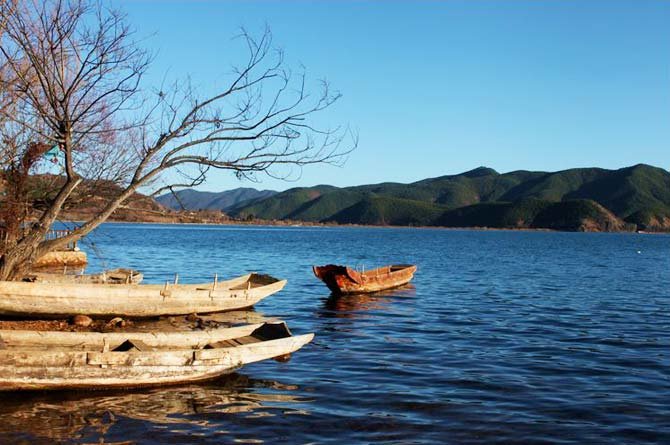
The lake's shores are inhabited by many minority ethnic groups, such as the Mosuo, Norzu, Yi, Pumi and Tibetan. The most numerous of them all are the Mosuo people, also spelt Moso people, said to be a sub clan of the Naxi People (as per Chinese records of Minorities in China) with ancient family structure considered as a live fossil for researching the marital development history of Human beings and the last quaint Realm of Matriarchy. It is considered as the home of the Mosuo Tribe. However, Mosuo have a separate identity from the Naxis, as it is said that the Chinese used the word Mosuo as a generic term for different ethnic groups, including the Naxi.
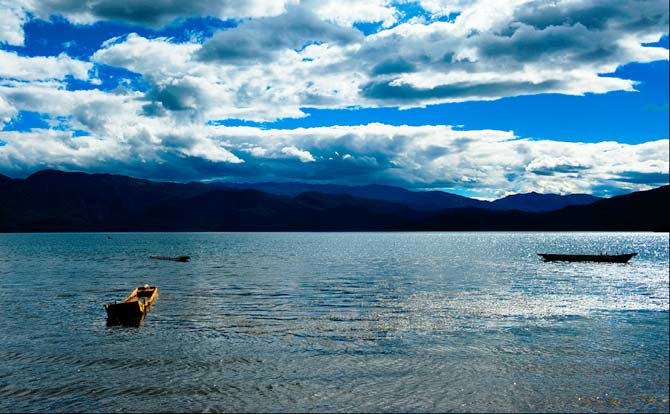
Lugu Lake is called the mother lake by the Mosuo people. The lake is also well-known in Chinese travel pamphlets as the region of Amazons, The Kingdom of Women and Home of the Matriarchal Tribe, this last name highlighting the dominant role of the Mosuo women in their society. The marriage rites of the Mosuo people are known as azhu marriage ceremony and this unique aspect of their social culture has given the title exotic land of daughters to the area. It is also known as a Quaint Realm of Matriarchy. The matriarchal and matrilineal society of the Mosuos is also termed the Women’s World.
Etymology
In the Mosuo language, Lugu means falling into the water and hu means lake in Chinese, which combined together give the name of the lake.
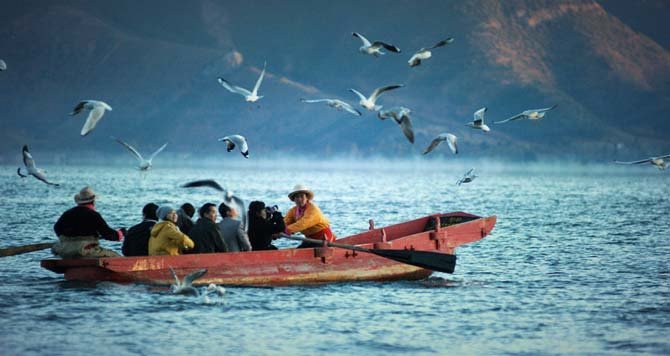
Geography
Lugu Lake is a natural lake in the Hengduan Mountain System, and has a horseshoe shape. It is located in a high plateau amidst the Xiaoliangshan hills of Western Yunnan. The Lion Mountain that surrounds the lake, which is worshipped as the goddess Gammo, is the chief deity of the Mosuo people who inhabit the area. The lake's main storage is from rainfall and its waters display a turquoise blue colour. The south shoreline of the lake is located in Yi Autonomous region of Ningland. The maximum depth in the lake is about 90 metres which makes it the second deepest lake in China, after the Fuxian Lake south of Kunming. The lake is hemmed on both sides by steep mountains and partly forested slopes. The lake is fed by the Mosuo River and the outlet is the Gaizu River, which joins Yalong River and eventually into the Jingshajiang River or the Yangtze River.
The Gaizu River, flowing out of the lake at its southeast end, has an outlet control which is operated seasonally, only during the rainy season, and the rest of the time (September to May) it remains closed. The shore line is winding and has thus developed many beaches which have become popular tourist attractions. The lake waters exhibit transparency to a depth of 11 metres. The lake has four prominent peninsulas and five islands. The five islands are: Heiwawu Island in the centre of the lake with a variety of birds living on it; Liwubi Island, Lige Island, Heiwawu Island, Liwubi Island, Nixi Island (the smallest island which has an oblong-shaped rock, covered by shrubs and moss); and the Lama Island. The three peninsulas and an island are linked to a seawall on the shore by a stone-paved path.
The shoreline of the lake is occupied by several ethnic minorities belonging to the Mosuo, Norzu, Yi, Pumi and Tibetan tribes. The lake is snowbound for three months a year, and the autumn and spring seasons bring a cool and dry climate, when the day temperatures are warm.
Important villages on the shore of the lake are Luoshui and Lige, which are both tourist centres. A walking tour along the periphery of the lake is a popular way of seeing the scenic beauty of the lake and its precincts.
Until 1982 there were no roads to the lake. The lake is 200 kilometres away from the Lijiang city, the headquarters of the Ninglang province, along a road that passes through some of the most scenic sights en route between Zhongdian / Shangri La and Dequin. The road, however, is affected by bad weather. The village roadhead on the shores of the lake that is connected with Lijiang city is known as Luoshui, a village, part of a larger Luoshui Administrative Village.
Luoshoi village on the Yunnan side and Mukua village on the Saichun side of the lake can be approached by canoes via the Lama Island. The canoes are known as zhucaochuan in the local language, which means the pig-trough boats. The trek route, which is popular among Buddhist pilgrims, starts at Luoshoi and also ends there. Buddhism is prevalent around the lake, as the shores of the lake have Tibetan-type monasteries, mostly of the Gelugpa Order, established by the Tibeto Burman people who have settled around the lake.
The history of the place, however, is also well known for its matriarchal culture and also the dress of the Mosuo women and girls in particular, which is distinctly conspicuous for its maroon blouses and skirts that establish an aura of authority.
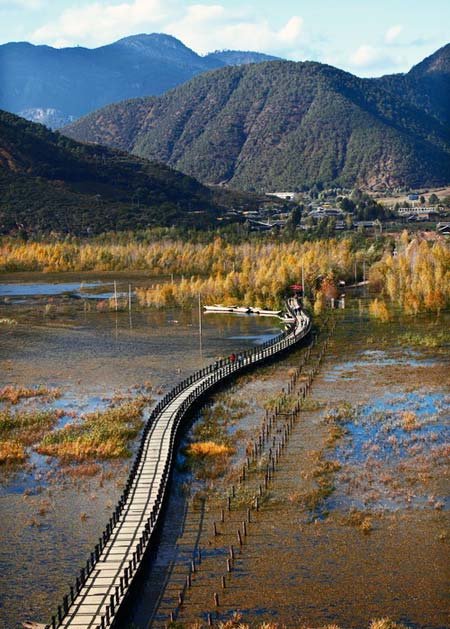
Flora and fauna
Lugu Lake, set in the subalpine zone in the southern Hengduan Mountains, is a pine-covered ecoregion. Apart from hosting endemic species of fish, Lugu Lake is visited by wintering water birds. The catchment of the lake in the Ninglang province has a fairly rich forest cover. The plant and tree species identified in the forest are: Yunnan pines, Chinese pines, lacquer, camphor, kapok and dragon spruce trees.
The fauna found in the area include fox, musk deer, vultures, hawks and leopard.
Mosuo people
The Mosuo people’s ancient history is identified with Lugu Lake and their interests are now protected by the "Lugu Lake Mosuo Cultural Development Association". They are advertised as a major tourist attraction of Lugu Lake for their matriarchal traditions and “walking marriages,” where marriage is not sacrosanct as women exercise the right to choose and change their husbands at will. According to the 1990 database, there were 90,000 Mosuos, mostly concentrated around Lugu Lake. Their ethnicity has been defined as Masuo people belonging to the Pumi tribe, similar to the Mongolian ethnicity and a branch of the Naxi. Azu marriage is the way of living of the Mosuo people, and Azu in the local Mosuo language (which does not have its own script) means “intimate sweet heart”. It is a convenient arrangement in which the partners come and go as they like. Three types of Azu marriages have been mentioned namely, the “travelling marriage,” which is marriage without cohabitation; and the second type is the marriage with cohabitation that have developed into deep feelings after living under “travelling marriage” practice; they then live together and raise children as a family. The third type of marriage, which is linked to the history of Mongolian people occupying Lugu Lake who inculcated the practice of monogamous marriage among the Mosuo people, is called as “One on one marriage.” However, in all the three types of marriages, women have the rightful ownership of land, houses and full rights to the children born to them. The children carry their mother’s family name and pay greatest respect to their mothers who in turn enjoy high social status. It is for these reasons that Mosuo people of Lugu Lake are an attraction. The male companions are known as "axias" and they work for the women. Lugu Lake and Mosuo culture, though identified as syncratic, they are spread through out the hills surrounding the lake. The heart of Mosuo culture is concentrated in Yongning, known as the cultural capital of Mosuo people and their largest religious Tibetan monastery is located here. Yang Erche Namu, a Chinese born in a small village near Lugu Lake, is a famous writer and singer of Mosuo ethnicity. She has written several books including the one titled Leaving Mother Lake, her first book in English. Her career and life is a story of controversies. The minority report in Time mentions “Sex appeals. And today, the area around Lugu Lake, the Mosuo homeland where Namu grew up, has become a chic tourist destination, thanks almost entirely to the renown that Namu's book has brought it.” She had even proposed to the then divorced French president Nicolas Sarkozy during his visit to China; in a recorded video introduction uploaded to the internet, she praised the colour of his skin and stated that she would be "a perfect wife for him". (wikipedia)
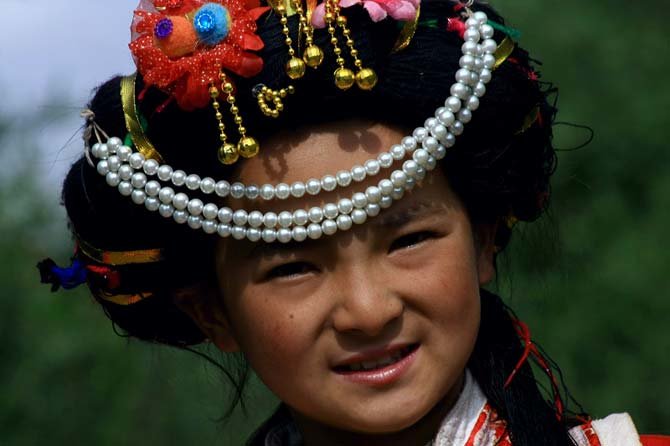
- 621 reads
